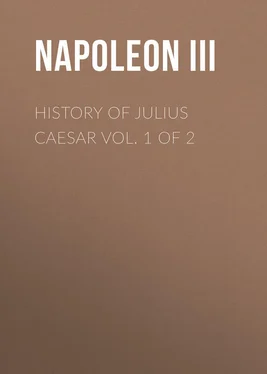Napoleon III - History of Julius Caesar Vol. 1 of 2
Здесь есть возможность читать онлайн «Napoleon III - History of Julius Caesar Vol. 1 of 2» — ознакомительный отрывок электронной книги совершенно бесплатно, а после прочтения отрывка купить полную версию. В некоторых случаях можно слушать аудио, скачать через торрент в формате fb2 и присутствует краткое содержание. Жанр: foreign_antique, foreign_prose, Биографии и Мемуары, на английском языке. Описание произведения, (предисловие) а так же отзывы посетителей доступны на портале библиотеки ЛибКат.
- Название:History of Julius Caesar Vol. 1 of 2
- Автор:
- Жанр:
- Год:неизвестен
- ISBN:нет данных
- Рейтинг книги:5 / 5. Голосов: 1
-
Избранное:Добавить в избранное
- Отзывы:
-
Ваша оценка:
- 100
- 1
- 2
- 3
- 4
- 5
History of Julius Caesar Vol. 1 of 2: краткое содержание, описание и аннотация
Предлагаем к чтению аннотацию, описание, краткое содержание или предисловие (зависит от того, что написал сам автор книги «History of Julius Caesar Vol. 1 of 2»). Если вы не нашли необходимую информацию о книге — напишите в комментариях, мы постараемся отыскать её.
History of Julius Caesar Vol. 1 of 2 — читать онлайн ознакомительный отрывок
Ниже представлен текст книги, разбитый по страницам. Система сохранения места последней прочитанной страницы, позволяет с удобством читать онлайн бесплатно книгу «History of Julius Caesar Vol. 1 of 2», без необходимости каждый раз заново искать на чём Вы остановились. Поставьте закладку, и сможете в любой момент перейти на страницу, на которой закончили чтение.
Интервал:
Закладка:
Slavery had long formed one of the constituent parts of society. The slaves, taken among foreigners and captives, 17 17 Dionysius of Halicarnassus, IV. 24.
and associated in all the domestic labours of the family, often received their liberty as a recompense for their conduct. They were then named freedmen , and were received among the clients of the patron, without sharing in all the rights of a citizen. 18 18 These questions have been the object of learned researches; but, after an attentive perusal of the works of Beaufort, Niebuhr, Gœttling, Duruy, Marquardt, Mommsen, Lange, &c., the difference of opinions is discouraging: we have adopted those which appeared most probable.
The gens thus consisted of the reunion of patrician families having a common ancestor; around it was grouped a great number of clients, freedmen, and slaves. To give an idea of the importance of the gentes in the first ages of Rome, it is only necessary to remind the reader that towards the year 251, a certain Attus Clausus, afterwards called Appius Claudius, a Sabine of the town of Regillum, distinguished, according to Dionysius of Halicarnassus, no less for the splendour of his birth than for his great wealth, took refuge among the Romans with his kinsmen, his friends, and his clients, with all their families, to the number of five thousand men capable of bearing arms. 19 19 Dionysius of Halicarnassus, V. 40. – Titus Livius, II. 16.
When, in 275, the three hundred Fabii, forming the gens Fabia , offered alone to fight the Veians, they were followed by four thousand clients. 20 20 Titus Livius, II. 48. – Dionysius of Halicarnassus, IX. 15.
The high class often reckoned, by means of its numerous adherents, on carrying measures by itself. In 286, the plebeians having refused to take part in the consular comitia, the patricians, followed by their clients, elected the consuls; 21 21 Titus Livius, II. 64.
and in 296, a Claudius declared with pride that the nobility had no need of the plebeians to carry on war against the Volsci. 22 22 Dionysius of Halicarnassus, X. 15.
The families of ancient origin long formed the state by themselves. To them exclusively the name of populus applied, 23 23 “They called a decree of the people ( scitum populi ) the measure which the order of patricians had voted, on the proposal of a patrician, without the participation of the plebs.” (See Festus, under the words Scitum populi , p. 330.) – Titus Livius, speaking of the tribunes, puts the following words into the mouth of Appius Claudius: “Non enim populi , sed plebis , eum magistratum esse.” (Titus Livius, II. 56.)
as that of plebs was given to the plebeians. 24 24 “The plebs was composed of all the mass of the people which was neither senator nor patrician.” (See Festus, under the words Scitum populi .)
Indeed, although in the sequel the word populus took a more extensive signification, Cicero says that it is to be understood as applying, not to the universality of the inhabitants, but to a reunion of men associated by a community of rights and interests. 25 25 “Populus autem non omnis hominum cœtus quoquo modo congregatus, sed cœtus multitudinis juris consensu et utilitatis communione sociatus.” – (Cicero, De Republica , I. 25.)
Political Organisation.
III. In a country where war was the principal occupation, the political organisation must naturally depend on the military organisation. A single chief had the superior direction, an assembly of men pre-eminent in importance and age formed the council, while the political rights belonged only to those who supported the fatigues of war.
The king, elected generally by the assembly of the gentes , 26 26 “Populus curiatis eum (Numam) comitiis regem esse jusserat. Tullum Hostilium populus regem, interrege rogante, comitiis curiatis creavit. Servius, Tarquinio sepulto, populum de se ipse consuluit jussusque regnare legem de imperio suo curiatam tulit.” (Cicero, De Republica , II. 13-21.)
commanded the army. Sovereign pontiff, legislator, and judge in all sacred matters, he dispensed justice 27 27 “The predecessors of Servius Tullius brought all causes before their tribunal, and pronounced judgment themselves in all disputes which regarded the State or individuals. He separated these two things, and, reserving to himself the cognizance of affairs which concerned the State, abandoned to other judges the causes of individuals, with injunctions, nevertheless, to regulate their judgments according to the laws which he had passed.” (Dionysius of Halicarnassus, IV. 25.)
in all criminal affairs which concerned the Republic. He had for insignia a crown of gold and a purple robe, and for escort twenty-four lictors, 28 28 “The consuls, like the ancient kings, have twelve lictors carrying axes and twelve lictors carrying rods.” (Appian, Syrian Wars , 15.)
some carrying axes surrounded with rods, others merely rods. 29 29 “From that time Tarquinius Superbus carried, during the rest of his life, a crown of gold, a toga of embroidered purple, and a sceptre of ivory, and his throne was also of ivory; when he administered justice, or walked abroad in the town, he was preceded by twelve lictors, who carried axes surrounded with rods. ( Dionysius overlooks the twelve other lictors who carried rods only. ) After the kings had been expelled from Rome, the annual consuls continued to use all these insignia, except the crown and the robe with purple embroidery. These two only were withdrawn, because they were odious and disagreeable to the people. But even these were not entirely abolished, since they still used ornaments of gold and dress of embroidered purple, when, after a victory, the Senate decreed them the honours of the triumph.” (Dionysius of Halicarnassus, III. 62.)
At the death of the king, a magistrate, called interrex , was appointed by the Senate to exercise the royal authority during the five days which intervened before the nomination of his successor. This office continued, with the same title, under the Consular Republic, when the absence of the consuls prevented the holding of the comitia.
The Senate, composed of the richest and most illustrious of the patricians, to the number at first of a hundred, of two hundred after the union with the Sabines, and of three hundred after the admission of the gentes minores under Tarquin, was the council of the ancients, taking under its jurisdiction the interests of the town, in which were then concentrated all the interests of the State.
The patricians occupied all offices, supported alone the burden of war, and consequently had alone the right of voting in the assemblies.
The gentes were themselves divided into three tribes. Each, commanded by a tribune, 30 30 “The soldiers of Romulus, to the number of three thousand, were divided into three bodies, called ‘tribes.’” (Dio Cassius, Fragm. , XIV., edit. Gros. – Dionysius of Halicarnassus, II. 7. – Plutarch, Romulus , 25.) – “The name of tribune of the soldiers is derived from the circumstance that the three tribes of the Ramnes, the Luceres, and the Tatiens each sent three to the army.” (Varro, De Lingua Latina , V. § 81, p. 32, edit. O. Müller.)
was obliged, under Romulus, to furnish a thousand soldiers (indeed, miles comes from mille ) and a hundred horsemen ( celeres ). The tribe was divided into ten curiæ; at the head of each curia was a curion. The three tribes, furnishing three thousand foot soldiers and three hundred horsemen, formed at first the legion. Their number was soon doubled by the adjunction of new cities. 31 31 Dionysius of Halicarnassus, II. 35. Attempts have been made to explain in different ways the origin of the word curia . Some have derived it from the word curare , or from the name of the town of Cures , or from κὑριος, “a lord:” it seems more natural to trace it to quiris ( curis ), which had the signification of a lance (Dionysius of Halicarnassus, II. 48. – Plutarch, Romulus , for thus we obtain a term analogous with that of the Middle Ages, where spear signified a man-at-arms , accompanied by six or eight armed followers. And as the principal aim of the formation of the curia was to furnish a certain number of armed citizens, it is possible that they may have given to the whole the name of a part. We read in Ovid, Fasti , II. lines 477-480: — “Sive quod hasta curis priscis est dicta Sabinis, Bellicus a telo venit in astra deus: Sive suo regi nomen posuere Quirites, Seu quis Romanis junxerat ille Cures.”
Интервал:
Закладка:
Похожие книги на «History of Julius Caesar Vol. 1 of 2»
Представляем Вашему вниманию похожие книги на «History of Julius Caesar Vol. 1 of 2» списком для выбора. Мы отобрали схожую по названию и смыслу литературу в надежде предоставить читателям больше вариантов отыскать новые, интересные, ещё непрочитанные произведения.
Обсуждение, отзывы о книге «History of Julius Caesar Vol. 1 of 2» и просто собственные мнения читателей. Оставьте ваши комментарии, напишите, что Вы думаете о произведении, его смысле или главных героях. Укажите что конкретно понравилось, а что нет, и почему Вы так считаете.












